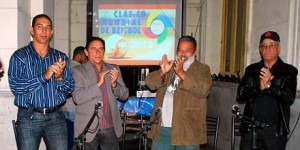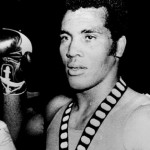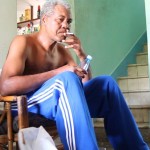Todavía Javier Méndez, el elegante jardinero central del equipo Industriales, espera que las autoridades deportivas le hagan un retiro oficial. Y créanme que no ha sido una omisión involuntaria.
A grandes estrellas del béisbol local al estilo de Lázaro Vargas, Omar Linares o Germán Mesa, tras diez años de retiro, no se les ha tributado una despedida por todo lo alto, como su afición desea.
Si esto sucede en el deporte nacional, qué podemos esperar de otras disciplinas. Mientras luminarias como Mireya Luis, Javier Sotomayor o Raúl Diago regentean paladares de calibre, y otros se casan con extranjeros para vivir en un limbo rosa entre dos mundos, la mayor parte de los héroes deportivos nacionales viven en el olvido.
En determinadas fechas, un comentarista deportivo los trae a colación. O el periodista televisivo Aurelio Prieto les hace una entrevista en su programa sobre viejas glorias, donde casi todos se quejan del trato incorrecto de las autoridades tras su jubilación.
Aquellos deportistas profesionales o amateurs que decidieron quedarse a vivir en Cuba después de que Fidel Castro se hiciera con el poder a punta de carabina, la pasan aún peor.
Quizás ha sido Yasel Porto el único reportero oficial que ha dedicado tiempo para divulgar las antiguas hazañas deportivas en la radio y la televisión. La amnesia del régimen con quienes brillaron en el deporte no sería tan preocupante si no observáramos la indigencia en que viven algunos atletas retirados.
La edad útil de un deportista es corta. En muchas disciplinas, como la gimnasia rítmica o artística, a los 30 años se es un anciano. En otros deportes, gracias a los avances científico-técnicos, y por qué no, utilizando novedosas formas de dopaje, se puede llegar a competir pasados los 40.
 Comentarista deportivo AURELIO PRIETO, 2do. Izquierda.
Comentarista deportivo AURELIO PRIETO, 2do. Izquierda.
En especialidades como el golf o la más longeva de todas, la equitación, hay competidores de hasta 70 años. Pero en Cuba, excepto los hijos de la exclusiva burguesía verde olivo, esos deportes apenas se practican.
Por orden de Fidel Castro, todas las luminarias deportivas cubanas compitieron de manera aficionada. Por tanto, no tienen cuentas en el banco y deben sobrevivir con un miserable retiro.
Algunos se buscan unos pesos extras vendiendo aguacates. La mayoría intenta gestionar una colaboración como entrenador en el extranjero. Hay casos de basquetbolistas habaneros que son contratados como porteros o personal de seguridad en instalaciones hoteleras.
Hay un jugador que brilló en la liga nacional de baloncesto que ahora es guardaespaldas de un millonario ruso. Y ha tenido suerte. Pues un doble campeón olímpico como Héctor Vinent anda atrapado en el flagelo de las drogas.
A un boxeador formidable, tres veces campeón olímpico, Teófilo Stevenson, el alcohol le aceleró la muerte. Nunca quiso el recio pegador tunero aceptar un cheque en blanco y pelear en el pugilismo profesional.
Por decreto estatal, debía boxear para su pueblo. Stevenson escogió ese camino. Fue su decisión. Antes que Dios se lo llevara, andaba en su antiguo y abollado auto soviético, vestido con una guayabera blanca que combinaba fatal con sus zapatones chapuceros. Por un trago de ron al strike, contaba anécdotas sobre aquel posible combate con Mohamed Alí que nunca se llegó a dar.
Según las nuevas regulaciones del régimen —un intento por insertar a Cuba en el deporte profesional moderno, que es ante todo de clubes—, es probable que los deportistas, pensando en su futuro, puedan ahorrar dinero.
Entonces cabría preguntarse si valió la pena que glorias como Teófilo Stevenson renunciaran a salarios millonarios por cuestión de ideología.
DDC/Ivan Acosta/InternetPhotos/www.thecubanhistory.com
Las glorias deportivas que el país olvidó
The Cuban History, Hollywood.
Arnoldo Varona, Editor
Foto por Karel Poort with Blado Ruiz. – Calles de la Habana. (Villega entre Obispo y O’Reilly).

SPORTS: GLORIES IN SPORTS THE COUNTRY FORGOT.
Still Javier Mendez , the elegant center fielder Industrial team , hopes the sports authorities will make an official retirement . And believe me it was not an oversight .
A local baseball superstars style Lazaro Vargas , Omar Linares and Germán Mesa, after ten years of retirement, they have not been taxed a farewell in style , as his fans want.
If this happens in the national sport, what can we expect from other disciplines. While luminaries as Mireya Luis , Javier Sotomayor and Raul Diago regentean gauge palates , and other marry foreigners to live in limbo between two worlds pink , most national sporting heroes live in oblivion .
At certain times , the sports commentator brings up . Or the television journalist Aurelio Prieto makes them an interview at his old glories program , where nearly all complain of poor treatment from the authorities after his retirement .
Those professional or amateur athletes who decided to live in Cuba after Fidel Castro took power at the point of carbine , the worse happen .
Perhaps Yasel Porto has been the only official reporter who has devoted time to release the old sports achievements in radio and television. The regime’s amnesia who shone in sport would not be so troubling if we looked at the poverty in which some retired athletes .
 Comentarista deportivo AURELIO PRIETO, 2do. Izquierda.
Comentarista deportivo AURELIO PRIETO, 2do. Izquierda.
The age span of an athlete is short. In many disciplines, such as rhythmic or artistic gymnastics at the age of 30 is an elder. In other sports , thanks to scientific and technical progress , and why not , using novel forms of doping , you can get to compete past 40.
In specialties such as golf or the longest of all , riding , there are competitors up to 70 years. But in Cuba , except the children of the bourgeoisie exclusive olive green , those sports just practiced .
By order of Fidel Castro , Cuban sports fixtures all so fond competed . Therefore, do not have bank accounts and must survive on a miserable retirement.
Some are looking for some extra bucks by selling avocados. Most attempts to manage a collaborative coaching abroad. There are cases of habaneros ballers who are hired as janitors or security personnel in hotels .
There is a player who shone in the national basketball league is now a millionaire Russian bodyguard . And was lucky . As a double Olympic champion as Hector Vinent trapped walks scourge of drugs .
A formidable boxer , three times Olympic champion Teofilo Stevenson , alcohol quickened death. He never wanted the tough puncher tunero accept a blank check and fight in professional boxing .
By state decree , was boxing for his people. Stevenson chose that path. It was his decision . Before God took him away , he rode his battered old Soviet car , wearing a white guayabera fatal combined with sloppy brogues . For a shot of rum to strike , told anecdotes about that possible fight with Muhammad Ali that was never given .
According to the new regulations of the regime, an attempt to insert Cuba in modern professional sport , which is primarily of clubs -it is likely that athletes , thinking about his future , to save money.
So one might wonder if it was worth it glories as Teofilo Stevenson millionaires forego wages matter of ideology .
DDC/Ivan Acosta/InternetPhotos/www.thecubanhistory.com
Las glorias deportivas que el país olvidó
The Cuban History, Hollywood.
Arnoldo Varona, Editor



 DEPORTES: Las glorias deportivas que el país olvidó (Fotos) * * SPORTS: Glories in sports the country forgot (Photos).
DEPORTES: Las glorias deportivas que el país olvidó (Fotos) * * SPORTS: Glories in sports the country forgot (Photos).

